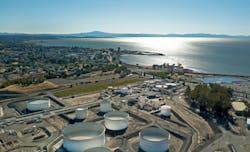Phillips 66 lets contract for San Francisco refinery-into-renewables conversion project
Phillips 66 has let a contract to Worley Ltd. to provide engineering services for the operator’s plan to convert the 120,000-b/d portion of its San Francisco refining complex in Rodeo, Calif. into a renewable fuels refinery as part of an investment strategy in the company’s energy transition to ensure long-term viability and competitiveness of its operations (OGJ Online, Aug. 13, 2020).
As part of the contract, Worley will deliver front-end engineering design (FEED) services for the project, which will reconfigure the existing conventional refinery to produce up to 2.5 billion l./year (650 million gal/year) of renewable transportation fuels from used cooking oils, fats, greases, and vegetable oils, the service provider said.
Worley did not reveal a value of the FEED contract or a timeframe for its completion.
Known as Rodeo Renewed, the proposed $750-800-million project would involve construction of new pretreatment units as well as repurposing of existing hydrocracking units to enable production of renewable diesel, renewable gasoline, and sustainable jet fuel for the California market. Combined with production of renewable fuels from an unidentified project also in development, the converted Rodeo plant, once fully operational, would produce more than 800 million gal/year (50,000 b/d) of renewable fuels, making it the world’s largest plant of its kind, according to Phillips 66.
Alongside the Rodeo conversion project, Phillips 66 also plans to shut down the Rodeo carbon plant and 44,500-b/d Santa Maria refining site in Arroyo Grande, Calif.—which converts heavy crude oil into high-quality feedstock for further processing into gasoline, diesel, and jet fuel at the Rodeo refinery—in 2023, with associated crude pipelines also to be taken out of service in phases starting in 2023.
Following completion of the reconfiguration project, Phillips 66’s San Francisco refining complex—which consists of the Rodeo plant in the San Francisco Bay Area and the Santa Maria refinery in Arroyo Grande, linked by a 200-mile pipeline—would no longer produce fuels from crude oil, resulting in anticipated 50% and 75% reductions in greenhouse gas and sulfur dioxide emissions, respectively, from the site as well as generation of credits under the California Low Carbon Fuel Standard (LCFS).
In its latest presentation to investors during February, Phillips 66—which is in the process of securing permits and completing its environmental impact report on the proposed Rodeo Renewed project—said, if approved by Contra Costa County officials and the Bay Area Air Quality Management District, Rodeo Renewed could begin renewable fuels production as early as first-quarter 2024.
About the Author
Robert Brelsford
Downstream Editor
Robert Brelsford joined Oil & Gas Journal in October 2013 as downstream technology editor after 8 years as a crude oil price and news reporter on spot crude transactions at the US Gulf Coast, West Coast, Canadian, and Latin American markets. He holds a BA (2000) in English from Rice University and an MS (2003) in education and social policy from Northwestern University.

